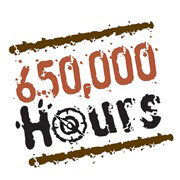by Ken Budd
Subways at rush-hour are unhappy places. Weary commuters slouch in tired clumps, pressed together like gummy bears in a bag, their blank expressions saying: I am in a dank, cramped, subterranean space; I am surly; I want to go home; do NOT attempt verbal communication.
But I experienced something different on a recent D.C. Metro trip with my friends Art Taylor and Tara Laskowski. Their four-year-old son, Dashiell, walked with his parents onto the subway car clutching his stuffed owl and best friend, JoJo. Dash sat next to a woman, smiled, happily told her we’d gone to dinner, that we were on our way to catch a commuter train home, and she smiled back, her eyes wide, cheeks warm—even Cruella de Vil would swoon at Dash—and she told him about her own little boys and girls. When we reached our stop, Art whispered instructions to Dash, who told the woman, “I hope you have a nice evening with your children.”
Meet JoJo: the much-patched Hobbes to Dash's far sweeter Calvin.
It was the loveliest subway trip of my life. Everyone—everyone—on the car smiled at Dash, riders of all nationalities and colors: Asians and Hispanics, Caucasians and African-Americans (including the kind woman who was Dash’s seatmate). No, I did not sing “Kumbaya”—that surely violates subway etiquette—but it was refreshing to experience such a love-thy-fellow-commuter moment, to see people so unexpectedly delighted by the happiness and smile of a four-year-old child.
We could all learn something from Dash. Smiling is contagious and can even reduce stress, research shows. But beyond being happy, Dash showed a basic and, yes, beautiful acceptance of all people. Bigotry is a learned behavior. Humans are not xenophobic in the womb. Yet we are exposing our children to a disturbing brutishness, the ugliness of the mob, the ugliness of fear, the ugliness of arrogance, ignorance, self-righteousness, rage. The number of hate groups in the United States rose by 14 percent in 2015. What, exactly, is happening to us?
Watching Dash, so unconcerned with people’s differences, so content, I've wondered if happiness and hatred are incompatible. Is it possible to be blissful and bigoted? Does one prevent the other? I, personally, have yet to meet a jolly racist. When white supremacists spew their beliefs, they seem like foul, angry, miserable people. How can you hate others for the shallowest of reasons, and think such fetid thoughts, and still find joy?
Following the recent death of Harper Lee, I reread the famous Atticus Finch quote in To Kill a Mockingbird: “You never really understand a person until you consider things from his point of view...until you climb into his skin and walk around in it.” My dad, in a letter to me and my sister, told us something similar: “Always look at the other side. Often you don’t fully understand unless you put yourself in the other person’s shoes.”
Empathy, sadly, seems unfashionable these days. And while hysteria and hostility are poisoning some children, it comforts me to know that kids like Dash are learning to respect others, and be kind to others, and to wear other people’s shoes. That, ultimately, is how we lose the very notion of otherness.
Ken Budd is the host of 650,000 Hours, a web series launching in 2019. He is the author of the award-winning memoir The Voluntourist and his writing credits include The New York Times, National Geographic Traveler, Smithsonian, The Washington Post, The Chicago Tribune, and many more.
Click here to subscribe to the 650,000 Hours newsletter. And please like our Facebook page!

